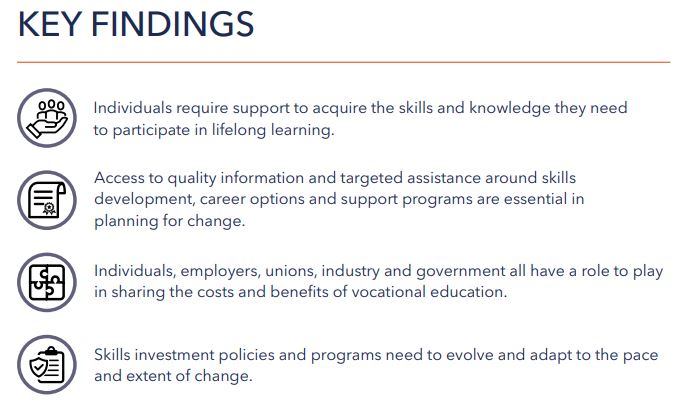Career Advice and the World of Future Work
11/08/2021
Jobs Queensland works with industry and community partners across the various parts of Queensland to provide well-researched, authoritative advice to the Minister for Employment and Small Business and Minister for Training and Skills Development and Queensland Government on patterns and trends in the State's workforce.

The nature of work and jobs are changing. Always have, always will. What’s different in 2021 and why is it important for the career development sector?
In one year, the COVID health crisis accelerated change in many workplaces than occurred over the last decade. For example, the pandemic rapidly brought forward hybrid and remote working arrangements to be widespread and accepted.
The integration of the physical and digital workplace is just one example of the broad changes we are seeing globally to ways of working, business models, and importantly, jobs and job tasks. In many ways the future of work is now.
These rapid changes are impacting the career advice sector and providing a catalyst to reimagine a broader role for career advice professionals.
Since 2018, Jobs Queensland has been undertaking a number of research projects examining the future of work and what it means for Queensland out to 2030. This research is informing advice to government about the trends driving changes to the economy and the implications for skills and employment.
While three broad trends were identified as driving change, it is evident that different groups are being impacted in different ways by these changes; some differences were magnified by the impacts of the pandemic.
The need for career development and career advice features strongly in the findings from Jobs Queensland’s Future jobs, future work report released in 2019. Access to career advice throughout an individual’s working life is needed. Accurate and timely data is crucial for informed decision making when planning and managing career transitions, not only for individuals, but for enterprises, industries or regions.

Future work, future jobs: Preparing Queensland for the evolution of work report, Page 24
Research confirms that technology will equally create new jobs and occupations as it will make some jobs and occupations redundant. Critically, we will see the use of technology changing job roles and job tasks within occupations. Many technical skills are changing quickly. Demand for uniquely human transferable skills and capabilities like communication, teamwork, empathy, collaboration and customer service is increasing.
Throw in the rapid changes in how businesses and individuals are working and what we find is that career advice professionals have a critical role to play in this new dynamic. Understanding where an individual’s skills and capabilities can take them will be a key workplace conversation for many. A key challenge will be knowing which skill and capability to develop and when, and how to develop them. The right blend of human and technical skill and capability to access work will remain important.
Career advice practitioners will need to navigate the uncertainty about the jobs of the future with the increasing demand for career development advice. What is clear is that it will be important that career advice is accessible throughout a person’s life.
Models of providing or accessing career advice will need to complement traditional engagement points during school and tertiary education. These models will need to support and encourage the existing and future workforce to adopt a lifelong learning mindset and embrace career development and career management opportunities. It will be important to foster and encourage individuals to plan and manage their own careers as this will support smoother career transitions, result in higher levels of workplace engagement and improved productivity.
A key piece of the puzzle is the role of vocational education including training. The education sector itself is changing. While it is expected that qualifications will still be key to entry into the workforce, demand for short courses and micro-credentials is expected to grow. Vocational education and career advice will play a significant role in enabling current and future job pathways.
This is an important juncture. There are opportunities to drive broad, holistic workplace strategies that start with the early career advice at schools and tertiary education institutions and continue to support people during their working lives and empowering them to make informed personal choices around managing their careers in an everchanging world.
To find out more about Jobs Queensland’s Future work, future jobs research, visit www.jobsqueensland.qld.gov.au/futurework.